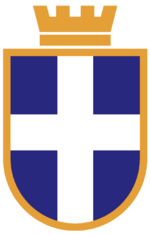IIWiki:Today's featured article: Difference between revisions
(August 2023 Update) |
(September 2023 Update) |
||
| Line 1: | Line 1: | ||
<div style="float:left;margin:0.5em 0.9em 0.4em 0;">[[File: | <div style="float:left;margin:0.5em 0.9em 0.4em 0;">[[File:Scovern_badge.png|150px]]</div> The '''Scovern national football team''' represents the [[Scovern|Kingdom of Scovern]] in international {{wp|association football}}. The team is overseen by the [[Scovern|Royal Scovernois Football Federation]] (KSFF) and is a member of the [[Euclea|Euclean International Football Federation]] (FIEF). Scovern had fielded a number of unofficial national teams in the 19th-century, but the first professional game played as Scovern was against [[Cislania]], one of the [[Werania|federal states of Werania]], in Weisstadt in 1900, which they won 2{{ndash}}1. These early teams were predominantly {{wp|amateur}}, though Scovern sent football teams to the [[Invictus Games]] when it was first introduced at the 1914 Summer Invictus Games in [[Liberty City]]. Formed in 1900, Scovern qualified for the first Coupe du Monde in 1939. The national team of the 1900s and 1910s drew heavily from {{wp|dockworkers}} and {{wp|ironmongers}} in [[Rimso]], the origins of its modern nickname "The Irons" (''Jernene''). Scovern joined the International Football Federation in 1917, and by the 1930s the national team was comprised of {{wp|professional}} or {{wp|semi-professional}} players. It reached the quarter-finals in the [[Werania|1971 Coupe du Monde]] but were eliminated by eventual winners [[Gaullica]]. The team of the early 1980s is usually considered as the height of Scovernois football, reaching the final of the 1983 Coupe du Monde but losing to [[Rizealand]]. Scovern went through a slump in the 1990s, however, failing to qualify for both the 1995 and 1999 Coupes and falling to a record-low 34th place on the IFF rankings in 1997. Scovern has also seen mild success at the [[Invictus Games]], having won two bronze medals in football. ('''[[Scovern national football team|See more...]]''') | ||
<div align="right"> | <div align="right"> | ||
Revision as of 00:10, 10 September 2023
The Scovern national football team represents the Kingdom of Scovern in international association football. The team is overseen by the Royal Scovernois Football Federation (KSFF) and is a member of the Euclean International Football Federation (FIEF). Scovern had fielded a number of unofficial national teams in the 19th-century, but the first professional game played as Scovern was against Cislania, one of the federal states of Werania, in Weisstadt in 1900, which they won 2–1. These early teams were predominantly amateur, though Scovern sent football teams to the Invictus Games when it was first introduced at the 1914 Summer Invictus Games in Liberty City. Formed in 1900, Scovern qualified for the first Coupe du Monde in 1939. The national team of the 1900s and 1910s drew heavily from dockworkers and ironmongers in Rimso, the origins of its modern nickname "The Irons" (Jernene). Scovern joined the International Football Federation in 1917, and by the 1930s the national team was comprised of professional or semi-professional players. It reached the quarter-finals in the 1971 Coupe du Monde but were eliminated by eventual winners Gaullica. The team of the early 1980s is usually considered as the height of Scovernois football, reaching the final of the 1983 Coupe du Monde but losing to Rizealand. Scovern went through a slump in the 1990s, however, failing to qualify for both the 1995 and 1999 Coupes and falling to a record-low 34th place on the IFF rankings in 1997. Scovern has also seen mild success at the Invictus Games, having won two bronze medals in football. (See more...)
KEEP THIS ONE PARAGRAPH IN LENGTH so it doesn't push the main page section down below the other section.
